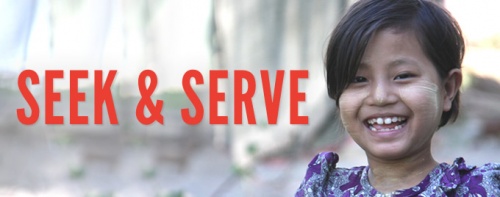Spring 2016 Seek & Serve Newsletter
As Crazy as the Lord
As you know, 2015 marked Episcopal Relief & Development’s 75th year. Our yearlong celebration culminated in an International Symposium that took place in New York this past November. From the very beginning of our planning, we envisioned the gathering as a time for in-depth discussion and exchange of expertise among our staff and international partners.
But just as important, we intended it to be a time for building fellowship and growing in relationship with one another. “Healing a hurting world” is a tall order, to say the least, and the energy that keeps us all going is a gift from God, through the mutual support and encouragement of our community.
The Symposium was remarkable from start to finish. The theme of the day was “Supporting Community Transformation,” a goal that we and our partners strive for through sharing, recognizing, and affirming each other’s valuable contributions.
A key component of our collective work has been to explore and share the energy and sense of spiritual calling that guides so many of the people with whom we partner. These are colleagues who deeply understand the importance of faith in remaining steadfast through the difficulties of working to alleviate poverty, hunger, disaster, and injustice in some of the world’s most challenging places. We wanted to provide them a platform to share their experiences and to be heard by a broad audience.
There were many extraordinary voices throughout the Symposium. The keynote was delivered by Dr. Jim Yong Kim, President of the World Bank Group, who discussed his connection to faith-based communities and inspired us all by quoting Presiding Bishop Michael Curry’s address to the 2012 General Convention of the Episcopal Church:
“We need some Christians who are as crazy as the Lord. Crazy enough to love like Jesus, to give like Jesus, to forgive like Jesus, to do justice, love mercy, walk humbly with God – like Jesus. Crazy enough to dare to change the world from the nightmare it often is into something close to the dream that God dreams for it. And for those who would follow him, those who would be his disciples, those who would live as and be the people of the Way? It might come as a shock, but they are called to craziness.”
Later, through presentations, panel discussions, and Q & A’s we heard from our partners, who are striving to be as crazy as they can in all corners of the world.
They have seen so much suffering – from the devastation of natural disasters, the struggles of food scarcity, and the anguish of those reeling from human conflict. Yet they’ve also been inspired by the resilience they’ve witnessed in the face of these challenges – hearing the vows to rebuild and re-plant and seeing the determination of parents working to ensure that their children will have opportunities for the future.
Hearing the thoughtful reflections of our partners was a truly humbling way to close a year filled with celebration, reflection, and gratitude for everyone who makes up our community and works to respond to the world’s suffering. Today I can tell you that we are full of excitement for the journey ahead, as we embark on our next 75 years!
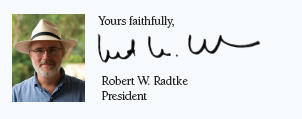
Opening Doors for Girls and Women
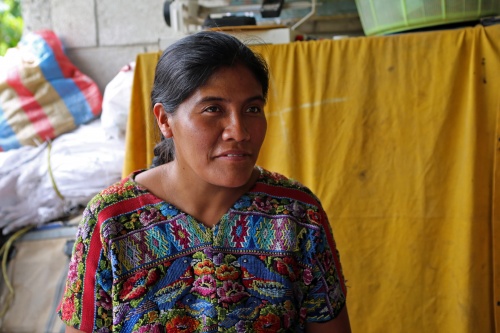 As a girl, Vilma Letizia Alburez Yancos wanted nothing more than an education. But when she shared this wish with her mother, the response was always the same: “Daughter, where am I going to get the money to pay for your studies?”
As a girl, Vilma Letizia Alburez Yancos wanted nothing more than an education. But when she shared this wish with her mother, the response was always the same: “Daughter, where am I going to get the money to pay for your studies?”
Vilma lives in a Chimaltenango, a rural village in Guatemala. Poverty in communities like Vilma’s is chronic and widespread. For the last decade, Episcopal Relief & Development has been working with the Episcopal Diocese of Guatemala to address the need by empowering residents – especially women – through the establishment of community-based savings and micro-finance groups.
Today Vilma is 35 and she has never saved money. Saving isn’t a habitual part of the culture, and it never seemed important to her. But now, saving money is changing her life, the lives of her children, and of her neighborhood.
Vilma is part of a community savings group that holds members accountable to save money each week. Since the concept of saving is new and unfamiliar, the money the women save gives them a sense of achievement and self-confidence. Further, it enables them to overcome emergencies when they occur and to discover new possibilities and capabilities. Many, like Vilma, are taking workshops on business and finance and are planning to start their own businesses. And the members of the savings groups aren’t the only ones benefiting.
Vilma has become an agent of change in her neighborhood, and her savings group has become the community’s unofficial bank. It gives loans to neighbors in need, all of which are paid back. In fact, it’s become the most successful savings group in Guatemala.
As the secretary of her group, Vilma acts as a role model in her home and throughout the community. Vilma’s saving has rubbed off on her two young daughters. At ages 9 and 10, they’ve already begun saving – for school supplies.
Vilma is saving for her daughters’ education. One of her daughters wants to be a doctor when she grows up, the other a chef. “When I am saving, I feel that I am improving myself,” Vilma says. “I am going to be able to give my daughters the education I couldn’t receive myself. They have their dreams. I will fight to make those dreams come true.”
We have a wonderful video featuring Vilma and we invite you to watch Viima’s story on our Facebook page.
Fighting Hunger with New Agricultural Techniques
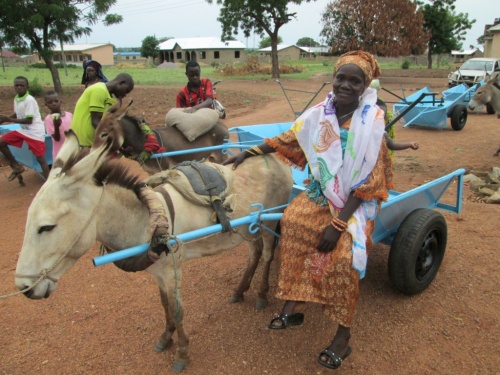 Too many people around the world lack sufficient food and adequate nutrition. This is hardly news. But it’s also not inevitable. Episcopal Relief & Development fights hunger and poverty in some of the world’s poorest communities by promoting sustainability and self-sufficiency. As we introduce new agricutural techniques to farmers, we help them increase their yield so they can move from scarcity to plenty.
Too many people around the world lack sufficient food and adequate nutrition. This is hardly news. But it’s also not inevitable. Episcopal Relief & Development fights hunger and poverty in some of the world’s poorest communities by promoting sustainability and self-sufficiency. As we introduce new agricutural techniques to farmers, we help them increase their yield so they can move from scarcity to plenty.
In many countries, agriculture is a centerpiece of local economies. The vast majority of people living in rural communities own or work for small family farms, and they rely on food production to feed their families. Yet throughout the world, hunger remains a dismaying fact. Almost one billion people are affected by chronic hunger and poverty.
Episcopal Relief & Development and its partners work with small-scale farmers around the globe to ensure that food is available, accessible, and affordable. Along with Church partners and local organizations, our goal is to empower communities to improve food production by providing training, tools, and resources —so they can feed themeselves and their families and generate income.
In Burundi, for example, hunger is epidemic. The country ranks last on the International Food Policy Research Institute’s most recent Global Hunger Index. Owing to population density and hilly topography, Burundi faces chronic challenges in maintaining its food supply. Farmers have to contend with soil erosion, crop disease, limited seed supply, and lack of market access.
Most of the families we work with in Burundi grow only a few crops, and they often don’t grow enough of those to last the whole year. As a result, many make do with only one or two meals a day for months at a time.
Through a partnership with the Church of Burundi and Cornell University, Episcopal Relief & Development is working to increase overall food production and diversify family diets through the introduction of “kitchen gardens.” Sixty women were trained in a new garden design – a multi-tiered raised bed, with a composting area right in the center. They planted a diverse range of nutrient-rich vegetables: greens, carrots, tomatoes, peppers. News of the gardens spread. Women shared seeds and techniques, and in five months the number participating shot up from 60 to more than 450.
In Ghana, Episcopal Relief & Development, in collaboration with the Anglican Diocesan Development and Relief Organization (ADDRO) is in the middle of a five-year project to help rural farmers increase their productivity, reduce crop loss after harvest, and conserve natural resources. One innovative project is giving women farmers access to donkey plows. These women typically put in long hours of grueling labor, farming only with hand tools. ADDRO trains the women in donkey care, use of the plow, and improved agriculture techniques and provides credit so they can purchase a donkey, plow, and cart.
And an ocean away in Myanmar, where poor farming practices have decimated the soil and chronic malnutrition is a serious problem, we’re working with the Anglican Church of the Province of Myanmar, to improve agricultural techniques and increase food security. In the Yangon region, a six-acre demonstration farm provides practical, “farmer field school” training courses. Farmers learn strategies for boosting crop production and then can apply the practices on their own plots.
In rural communities around the world knowledge and empowerment are the mighty seeds that will provide long term abundance.
UPDATE REPORT: SYRIAN REFUGEES
Many people wonder: How do we respond in faith to overt suffering in our midst, especially if the proportions of a crisis are vast? The Syrian crisis raises such questions.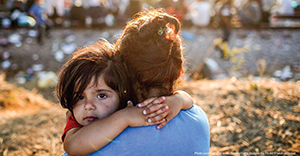
As we reported in the last issue of Seek and Serve, hundreds of thousands have died and millions of people have fled Syria since the start of the conflict more than four years ago. 7.6 million Syrians have been internally displaced within the country. In the face of unrelenting fear and violence, more than 11 million people have been forced to flee their homes. In Syria, more than four out of five people live in poverty.
Episcopal Relief & Development is continuing to respond to the crisis by working with local organizations and Anglican and ecumenical agencies at each stage of people’s journey to safety. We have renewed our support of displaced persons within Syria through the Fellowship of Middle East Evangelical Churches, which has been actively responding to the crisis since the conflict began.
We’re also supporting Islamic Relief’s efforts on the island of Lesvos, Greece, to provide necessary services to people en route to mainland Europe. Elsewhere, the Convocation of Episcopal Churches in Europe is responding through local ministries in Austria, Belgium, France, Germany, Italy, and Switzerland.
For those of us here in the United States, the refugee crisis might feel remote. But in countries like Germany where many thousand of refugees have sought entry, the call to welcome strangers is immediate.
Nagulan Nesiah, a senior program officer for Episcopal Relief & Development, has said that it’s important for the church to remain a place of refuge for people fleeing disaster-related and human-made crises worldwide. “This is demonstrated beautifully by the ministry of Church of the Ascension in Munich, where the church has opened its doors for hospitality, worship, and accompaniment while maintaining the dignity of those they serve.”
Episcopal Relief & Development will continue to assist in any way we can the unthinkable number of refugees and those left behind. We will pray for the people of Syria and for an end to the devastating conflict.
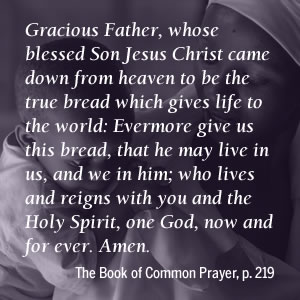
This prayer is included in this year’s book of Lenten meditations – a collection of reflections created to encourage contemplation and deepen our faith in the risen Christ. Lent is a time of prayer and self-examination, a time to consider our spiritual life more fully. It’s a time to ask ourselves: How does God live in us? How do we manifest Christ and carry out our vocation for stewardship?
Lent can also be a time to consider how our legacy will live on after we’re gone. Making a planned gift is one meaningful way to ensure that our care for the world survives in our absence. By adding a bequest to your will or making other type of planned gift to Episcopal Relief & Development, you can ensure that the critical work of responding to the world’s suffering will continue for many years to come.
Please consider joining Episcopal Relief & Development’s Matthew25 Legacy Society. The Society provides a number of ways to ensure that your stewardship lives far into the future. To learn more, contact us at 1-855-312-HEAL (4325). You can also find information at episcopalrelief.org/plannedgiving.

